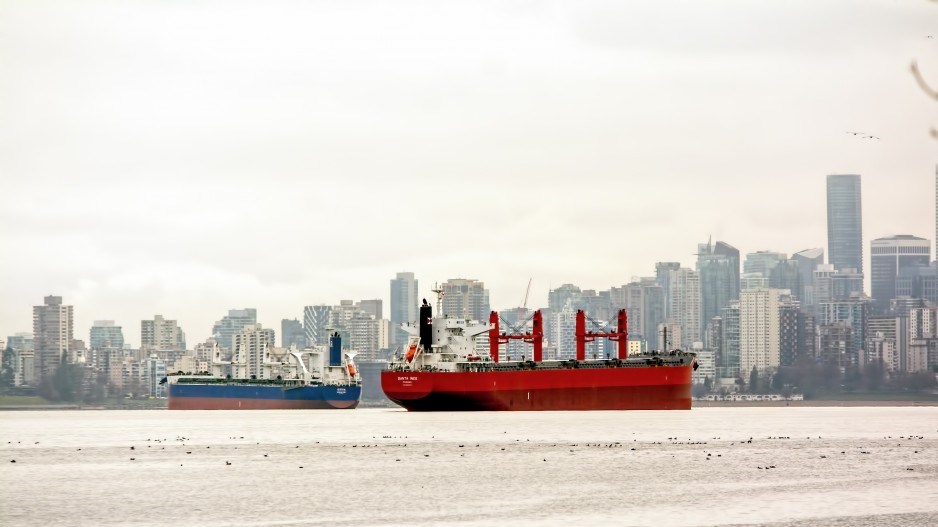An extreme wildfire season and increased ship traffic are creating cargo logjams at the Port of Vancouver.
According to the port’s operations report issued on July 19, in addition to the ships that are at berth, all English Bay anchorages are full. The cargo traffic jam extends to the southern Gulf Islands, where only 10 anchorages remain available.
The port’s eHub app data shows that, as of July 21, there are now 65 vessels at the Port of Vancouver: 27 at berth and 38 at anchorage awaiting a berth opening.
“All anchorage class assignments are experiencing heightened demand, and availability in both port jurisdiction and the southern Gulf Islands is very limited at the moment,” the port’s operations report said.
The heaviest backup appears to be coal, grain and potash vessels. On July 21, there were 15 coal ships waiting at anchorage for two occupied berths. Meanwhile, eight grain vessels (waiting for six berths) and four potash vessels (waiting for one berth) are anchored in the port.
There are also two container ships and one each of bulker, car carrier, chemicals, crude, dry cargo and edible oil vessels currently waiting in line for a berth, according to port data.
As BIV has previously reported, container ship cargo up and down the West Coast of North America has been congested since the second half of 2020.
The situation, officials said, is further complicated by the wildfire season in B.C., which resulted in the federal government issuing an order on July 11 for rail operators to guard against wildfire risk given the extreme heat and dryness seen in the Interior since the end of last month.
Although trains are again moving between Kamloops and Boston Bar after a 48-hour stoppage due to the Lytton fire, train operators now face speed restrictions, increased equipment checks and deployment of fire-prevention equipment, all of which reduce rail transportation efficiency to and from the port.
“Operations may be subject to temporary stoppages due to spot fires,” the port said of rail transport through B.C., although it did note that rail transportation has increased since July 16, when CN Rail (TSX:CNR) was forced to stop its Prince George-to-Vancouver operations and CP Rail (TSX:CP) had to reduce capacity on the route.
In its daily summary for rail cargo waiting on Port of Vancouver docks before being moved onto trains or ships, wait times on July 20 reported at Vanterm and Fraser Surrey Docks exceeded seven days. GCT Deltaport is reporting on-dock wait times for rail cargo of five to seven days, while Centerm is the least congested at a wait time of three to five days.
According to port data, wait times for CN cargo at all terminals other than Centerm exceed seven days. That contrasts sharply with May numbers, when the average dwell time was only around 3.7 days.
For its part, the Vancouver Fraser Port Authority said that because of B.C.’s wildfire situation there is an “evolving and changing” impact on rail operations to and from the port that is expected to continue for the near term.
“We are working closely with Transport Canada, the railways, and supply chain stakeholders to assess the impact on the movement of goods to and from the Port of Vancouver,” a port spokesman said regarding the current congestion at the port.
Port data is showing one bright spot, however: truck wait times for loading and unloading have been minimal. The port’s eHub reports that, as of July 21, no truck wait times are exceeding one hour at Centerm, Vanterm, Fraser Surrey Docks and Deltaport. Average truck traffic wait times at Fraser Surrey Dock are only 27 minutes.
– Chuck Chiang




